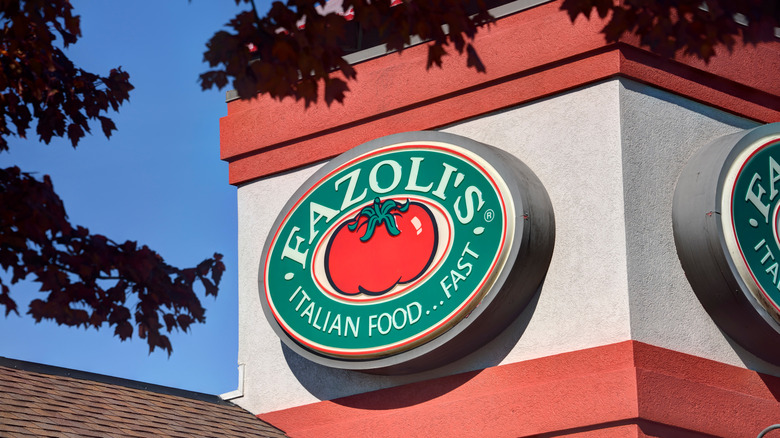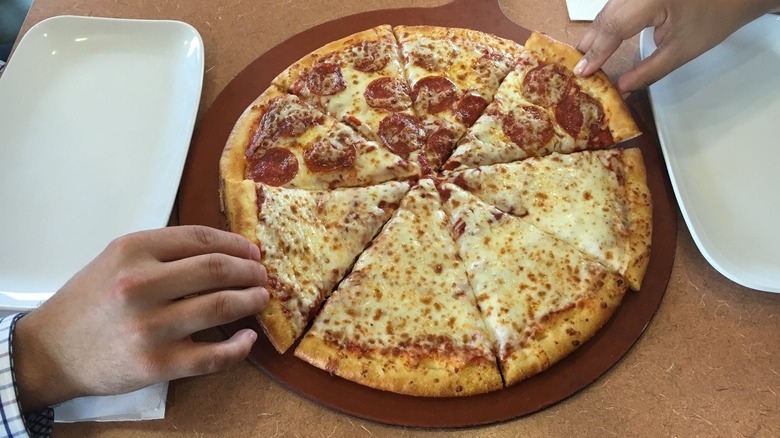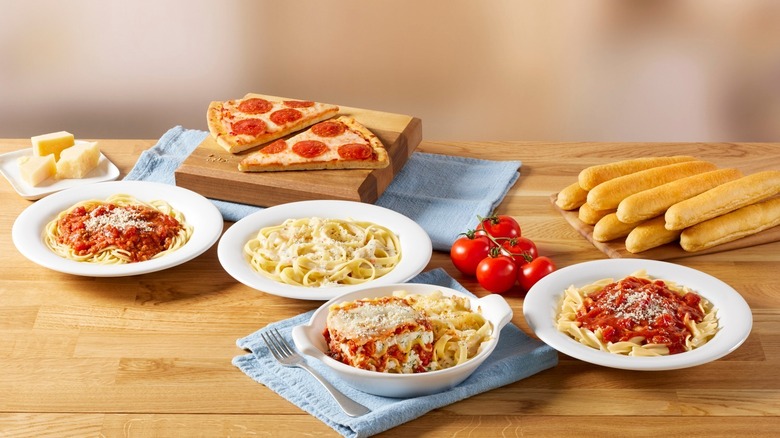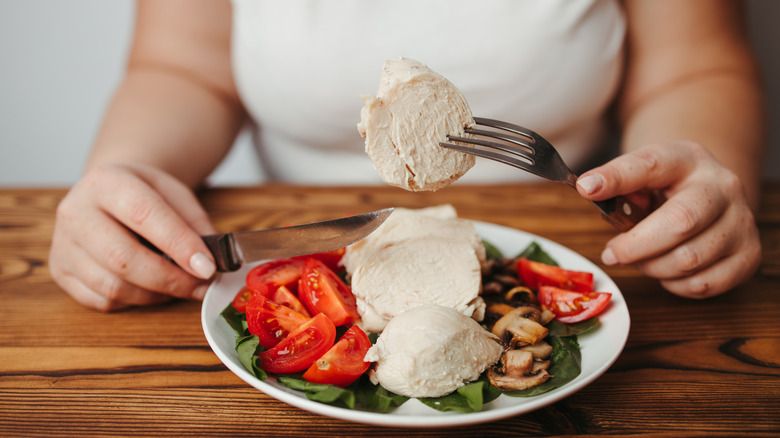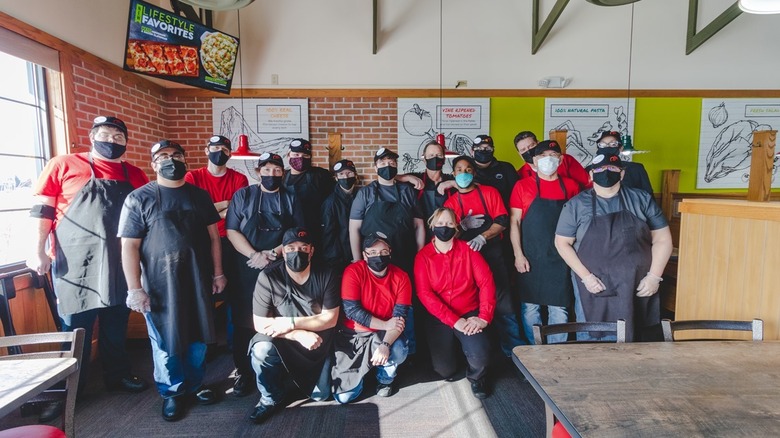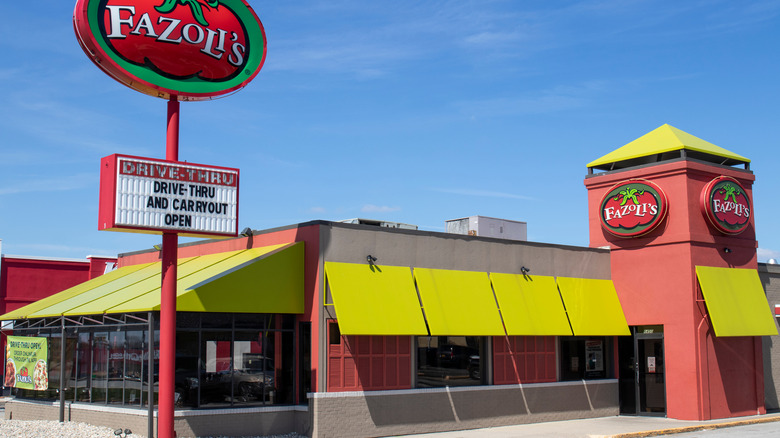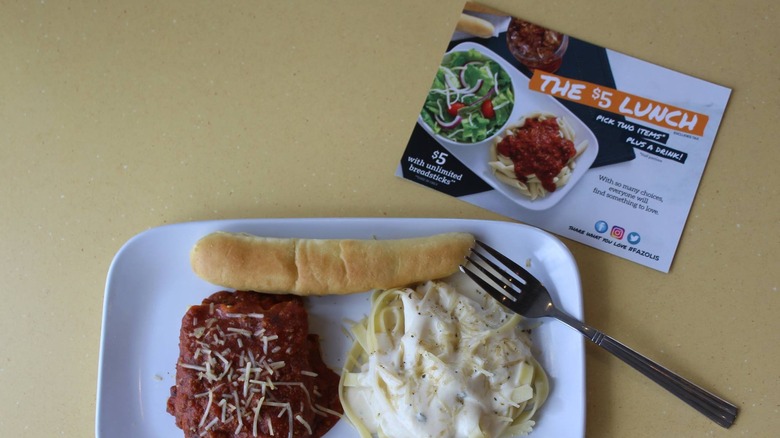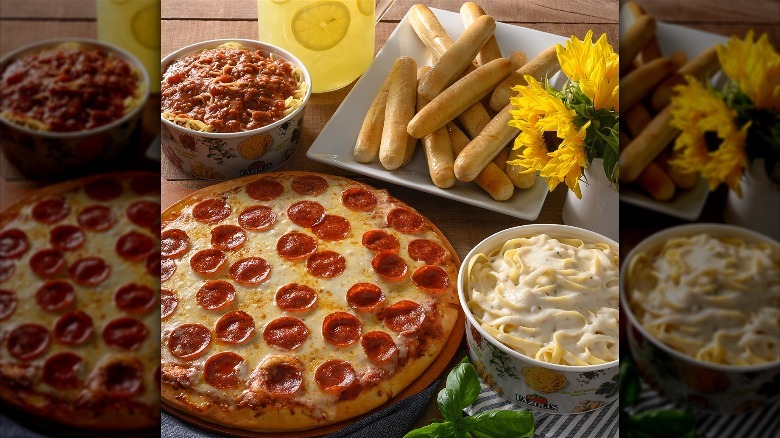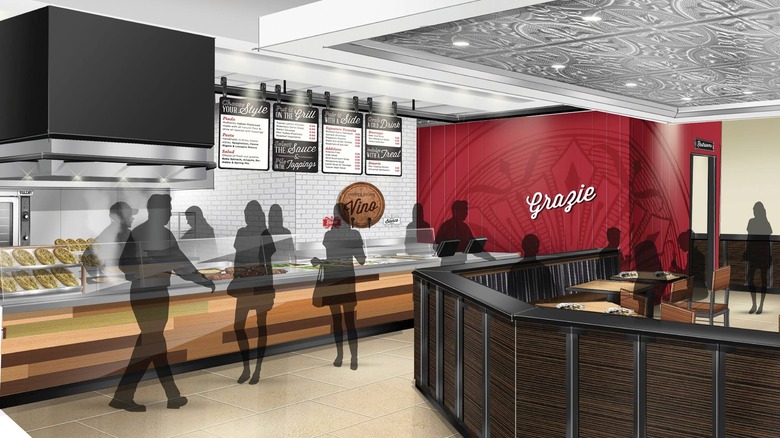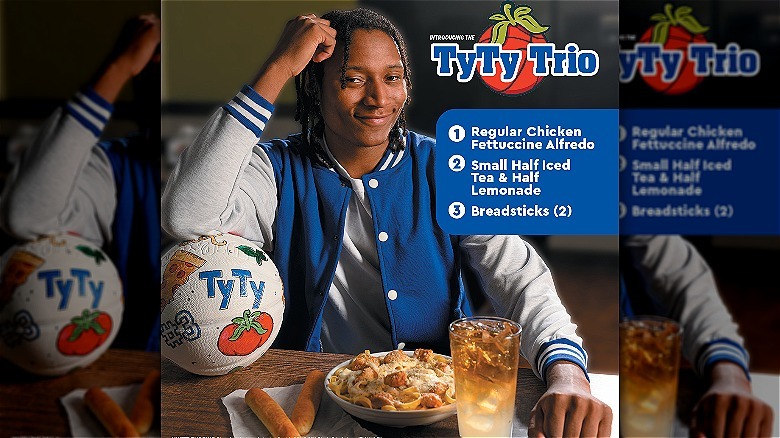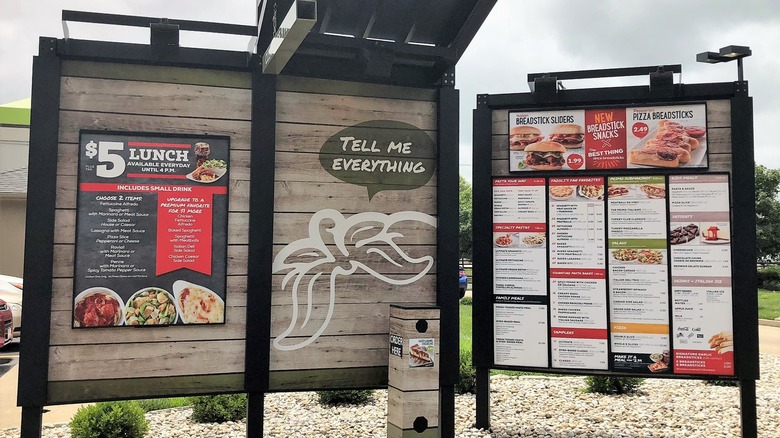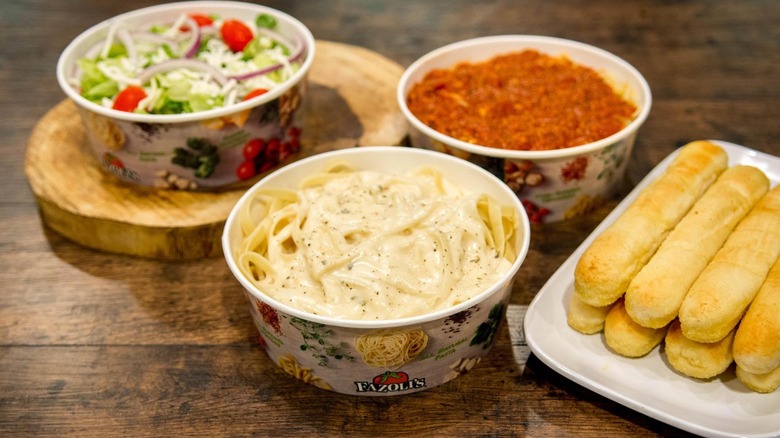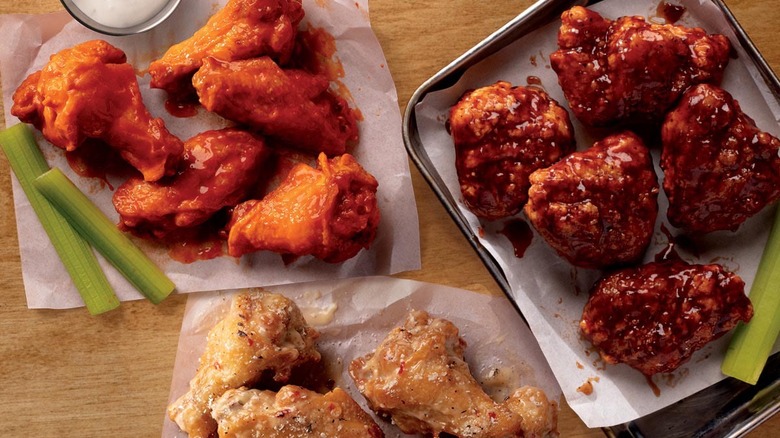The Untold Truth Of Fazoli's
Enjoying a classic Italian feast doesn't have to warrant a plane ticket to Italy — or even Little Italy! — as long as Fazoli's is around. For over 30 years, this Kentucky-based chain has served down-to-earth red sauce staples the whole family can enjoy, from stick-to-your-ribs pasta platters to concoctions like the Meatball da Vinci. It's affordable, comforting, and comes in generous portions that could rival any grandmother's Sunday dinner. Fresh breadsticks delivered on demand only sweeten the deal when visiting one of the 220+ locations across the country (via Scrape Hero).
Beyond picking up your carryout order or gathering in one of its spacious dining rooms, you probably don't think much of this Italian chain on a day-to-day basis. But there's more to it than meets the eye. Much like a baked lasagna, each layer of its story is stuffed with fascinating tidbits. The average customer might not know about its start as a pizza restaurant, or about the spin-off eatery that took Italian cuisine into new territory. And even if you're familiar with its friendly customer service, you probably don't know what its employees get in return for a job well done. Thankfully, there's nothing shocking in the untold truth of Fazoli's, but longtime fans will satisfy their curiosity as we take a look at the successes — and minor missteps — of this humble restaurant chain.
Fazoli's moved away from pizza to stand out from competitors
Fazoli's serves the kind of Italian fare Americans know and love: creamy pastas, garden salads, breadsticks, and of course, pizza. When Fazoli's launched in 1990, pizza was featured heavily on the menu (per Funding Universe). But, perhaps surprisingly, the franchise decided to distance itself from the dish altogether. That's right, the doughy delicacy imported from the city of Naples was actually dropped by an Italian joint — one that boasted the tagline "Real Italian. Real Fast," no less.
It may seem baffling that an Italian restaurant would get rid of pizza. According to Fast Food Menu Prices, the rationale from then-CEO Kuni Toyoda was that Fazoli's didn't have a chance of competing in a market dominated by big pizza chains. This was largely because the chain didn't offer delivery, and in terms of convenience, the dine-in format just couldn't offer the same appeal, so the chain focused on pasta instead as a way to stand out. That isn't to say pizza disappeared completely from Fazoli's — it's still on the menu — but it took a backseat in favor of a more diverse selection of dishes.
The menu has changed dramatically over the years
Change is necessary for any business looking to stay afloat long-term, and Fazoli's menu is an example of this strategy. Although certain things remain untouched — the big portions, for one — the chain hasn't hesitated to make adjustments. Take the mid-2000s, which was the era of the low-fat food trend. Per Fast Food Menu Prices, Fazoli's capitalized on the craze by rolling out its Smart Italian menu, which exclusively featured low-fat entrees. When trans fat came under fire for its harmful health impact, the chain responded by promptly overhauling its signature breadsticks.
Lately, the focus on clean eating has resulted in the chain scaling back its menu. Recently, Fazoli's took a page out of Panera's playbook when it axed a whopping 81 artificial ingredients from its menu, a process that took over a year to complete. As former CEO Carl Howard told QSR Magazine in 2017, "The consumer is your true north star and you have to be able to serve their needs today and their future needs. You're trying to build a business that's built to last," adding that customers' desires ultimately decide the course of the business. "That's part of why some brands are more successful than others. Our brand has certainly been through its share of ups and downs ... and I'm trying to build something great. I think this is one thing that the consumer wants now, that the consumer will expect in the future, and will demand at some point and time in my career."
The low-carb boom of the 1990s threatened business
The 1990s was a bad time for Italian restaurants, thanks to the low-carb diet. With consumers gravitating toward lean proteins and avoiding starches, items like bottomless breadsticks and saucy pasta bakes were taken off the table. Naturally, Fazoli's was caught in a bind. How does one market spaghetti and meatballs to a health-conscious audience?
Then-CEO Kuni Toyoda tapped into the restaurant's strengths to bring about a solution, and it turned out to be similar to his approach to pizza. Saying that diners "know what good pasta is," per Funding Universe, he led the charge to promote the nutritional superpowers of pasta to the masses. The idea was that pasta, unlike greasy choices from fast-food drive-thrus, actually provided nourishment to low-carb dieters.
Certainly, most of Fazoli's menu doesn't inspire much confidence in this claim — its gigantic "Submarino" sandwiches spring to mind. But there's some truth to pasta's relative health benefits. And as a franchise owner from Quincy, Illinois attests, deep fryers aren't really a thing at the restaurant (via the Quincy Area Chamber of Commerce). That makes baked meatballs and a salad a healthier choice than, say, a breaded chicken sandwich with mayonnaise. The chain continues serving low-carb fare, with options like The Keto Pepperoni & Bacon Flatbread available on its Lifestyle Menu (per Fazoli's).
Strong customer service is Fazoli's bread and butter
What exactly constitutes good customer service? Is it the cleanliness of the dining room? The complimentary appetizers? The friendly employees who check on your table throughout the entire meal? At Fazoli's, it's all of the above. The company has aimed to create a welcoming environment for its guests since day one, to the point where it's become a core part of its philosophy. Staff at Fazoli's receive thorough training in their respective roles and plenty of guidance from leadership. Under the "Guest Ambassador" program, per Fazoli's website, managers handle the restaurant's hospitality concerns, including dispensing free breadsticks to tables and refilling beverages.
By investing in its employees, Fazoli's is able to provide a high-quality experience in both food and service. Add in the family-style dining tables and family-sized portions, and customers are more likely to return repeatedly. As former CEO Carl Howard put it, "We're trying to give our customers the $15 casual-dining experience for $6 or $7" (via Nation's Restaurant News).
High-performing locations are rewarded
Longtime Fazoli's customers aren't the only ones who benefit from the chain's dedication to hospitality. Employees have also been known to receive tokens of appreciation for their hard work — beyond their regular paychecks. According to Funding Universe, Fazoli's enlists mystery shoppers who pretend to be customers to ensure that restaurants are performing to the company's high standards. Are staff members keeping the dining room tidy? Refilling drinks? Wiping down tables before welcoming the next group? All of these factors are weighed by these discreet figures.
In the case of Fazoli's, for locations that have ticked every box of the restaurant experience — scoring at least 90 out of 100 three times within a month – the employees have received bonus checks (per Funding Universe). Of course, rewards can come in other ways, like a kind note from a satisfied customer, but it's hard to beat cold, hard cash.
Limited-time offers keep things fresh
Between cheesy fettuccine and meatballs doused in marinara, Fazoli's menu is full of classics. There's no shame in being traditional. However, the restaurant has shown it isn't afraid to throw spaghetti at the wall to see what sticks. Every so often, Fazoli's unveils new, limited-edition entrees. Past items have included Chicken Marsala, Three-Cheese Tortellini Alfredo, and Philly Cheesesteak Ravioli as part of an exclusive Ravioli Fest promotion featuring other flavors (per Fazoli's).
Mouth-watering offers are a great way to rope in new customers — but for Fazoli's, the target audience for these limited-time deals is actually regular customers. Per Nation's Restaurant News, then-CEO Carl Howard explained in 2013 that those who ate out often would be more likely to try new items. The psychology behind it is that longtime visitors feel less attachment to their choices and can afford to step out of their comfort zone. If a customer only visits Fazoli's once in a blue moon, it makes sense to fall back on that go-to entree. Otherwise, why not grab the Ultimate Spaghetti before it's gone?
At Fazoli's, meal deals rake in the dough
For the amount that arrives on your plate, the food from Fazoli's is astonishingly cheap. A bowlful of pasta with a side salad and drink for only $10 is quite a bargain. The value-driven business model has helped Fazoli's succeed, and nothing embodies this more than its meal deals. Via Fast Casual, same-store sales jumped 21% across a 20-month period in 2021 because the chain offers bundled meals all year round. There's the 5 Under $5 promotion, where customers can select from an array of entrees costing $5 or less, while dinner bundles like the Super Family Meal feature supersized portions of pasta, sides, and beverages (per Fazoli's).
Per Fast Casual, both meal deals helped to keep the restaurant afloat in a time of financial uncertainty during the pandemic. In a statement on the chain's success in 2021, then-CEO Carl Howard emphasized the formula of big portions at low prices — "providing craveable Italian dishes with great service at a value and convenience that guests can't find anywhere else" — as essential to the chain's consistent progress. In other words, big helpings served on the cheap remains an unbeatable equation for restaurants like Fazoli's.
Fazoli's expanded its Italian offerings with a spin-off
Fazoli's focus as a family-oriented dining establishment has never wavered since its opening. Still, the potential to branch out into other avenues has created some interesting side hustles for the brand. Back in 2013, Fazoli's launched an Italian take on the fast-casual concept called Venti-Tre. The idea was simple: Customers could design their own pasta bowl, salad, or Piada wrap, choosing from an assortment of toppings to build it. As a press release shows, the name directly referenced the number of fixings from which diners could choose (23), such as cured meats, fried capers, focaccia croutons, dressings, sauces, and more. Think Chipotle, but with a Tuscan twist.
Per Fast Casual, Baltimore was the first location for the new concept, which was followed by the nation's capital and plans for further expansion. But it didn't appear to last long — just two years after opening, the inaugural restaurant closed its doors due to a failure to meet "sales expectations," according to restaurant spokesman Brad Ritter, with future openings cast into doubt (via The Baltimore Sun). There isn't much information on the spin-off's whereabouts, although a quick search on Yelp reveals that multiple locations have shuttered, which suggests the idea didn't take off with as much enthusiasm as expected.
The fast-casual model is a highly successful one, but perhaps that's part of the problem. In such a heavily saturated market, Fazoli's was unable to compete for a spot at the table.
The chain partnered with a college basketball star
There's a reason athletes commonly appear on cereal boxes, gum wrappers, and burger commercials — sports sponsorships are a powerful marketing tool. In 2021, Fazoli's landed a slam-dunk endorsement in 2021 when it nabbed a college sports luminary for an exclusive collaboration. Kentucky Wildcats point guard Tyrone "TyTy" Washington partnered with the restaurant on a meal deal called the "TyTy Trio," which consisted of chicken fettuccini alfredo, a small Arnold Palmer, and two breadsticks for $9.99. According to Restaurant News, it was sold during the peak of basketball season at restaurants in Lexington.
The collaboration was a significant moment for Fazoli's for a couple of reasons. For one, it was the Italian chain's first advertisement featuring a sports luminary. The other reason is that both are based in Lexington: The business established itself there, and Washington played for the University of Kentucky. Celebrating a hometown hero, even if it's with noodles and breadsticks, goes a long way toward showing local community pride — and although Washington may have since moved on to the Houston Rockets, he's forever made Fazoli's history.
Drive-thru service keeps Fazoli's flourishing
Staying in one's lane is sound advice for restaurants that have nailed a particular concept very well, but detours can sometimes lead to greater prosperity. Fazoli's has carved out a path as the only quick-service Italian establishment to feature a drive-thru in addition to dine-in and carryout service. Even current CEO Doug Bostick couldn't help remarking on its novel approach: "We have a drive-thru, which is completely unique among our biggest competitors and has always set us apart" (via QSR Magazine).
Drive-thru service helped the franchise immensely during the COVID-19 pandemic. Customers reportedly flocked to the chain during that time, according to QSR Magazine, because Fazoli's offered family meal bundles that could be ordered from the car. The drive-thru window provided a contactless way to deliver hot, fresh food. You might not associate bucketfuls of creamy noodles as fast food, but if it's the new normal, count us in.
Fazoli's copied Olive Garden's all-you-can-eat pasta promo
When Olive Garden introduced the Never-Ending Pasta Pass in 2014, it was like the heavens had parted and angels sang. The Darden-owned eatery seems to dominate the bottomless noodle market these days, but that doesn't mean it's the only player. Fazoli's took some creative liberty in launching a pasta promotion of its own, the Infinite Pasta Pass. As Nation's Restaurant News reported in 2018, the deal would allow customers to indulge freely in pasta and side dishes for eight weeks, essentially a blow-by-blow of the rival chain's signature offer.
However, there were some key differences between the two memberships, as Restaurant Business highlighted. Olive Garden's pass costs $100 for up to nine weeks of unlimited pasta; Fazoli's, on the other hand, was only $50. Olive Garden's version was only eligible for dine-in service, but Fazoli's pass-holders could claim their bounty through takeout and the drive-thru. When it comes down to it, Fazoli's was the better deal. Customers could get the same perk of inexhaustible food, only at a cheaper cost and with fewer limitations. Plus, breadsticks for the road? The winner is clear.
Virtual brands have been a hit for Fazoli's
It's safe to say Fazoli's is an unstoppable force in the restaurant business, and it just keeps on growing. Recently, the company has broadened its menu by going the virtual brand route, which allows for crafty, out-of-the-box fare that hits on a variety of tastes. There's Wingville, the chain's stop for flavored chicken wings like buffalo and parmesan garlic, and Macaroniville, which sells deluxe macaroni and cheese bowls alongside pizza, salad, and sweet treats.
As Nation's Restaurant News reported, Wingville spent an entire year in development before launching to the public, and by all accounts, it's been a major money-maker for the company. Total store sales exploded by 11% due to the finger food alone, the outlet reported.
Today, almost a majority of Fazoli's feature Wingville items, to the point where the 5 for $5 promotion features an order of chicken wings. Prior to that, the chain relied on ghost kitchens to roll out Wingville, since it started out as a purely digital brand, but the resulting success ended up justifying a permanent spot on the menu. It just goes to show that taking risks and experimenting pays off, even if it's a humble buffalo wing.
